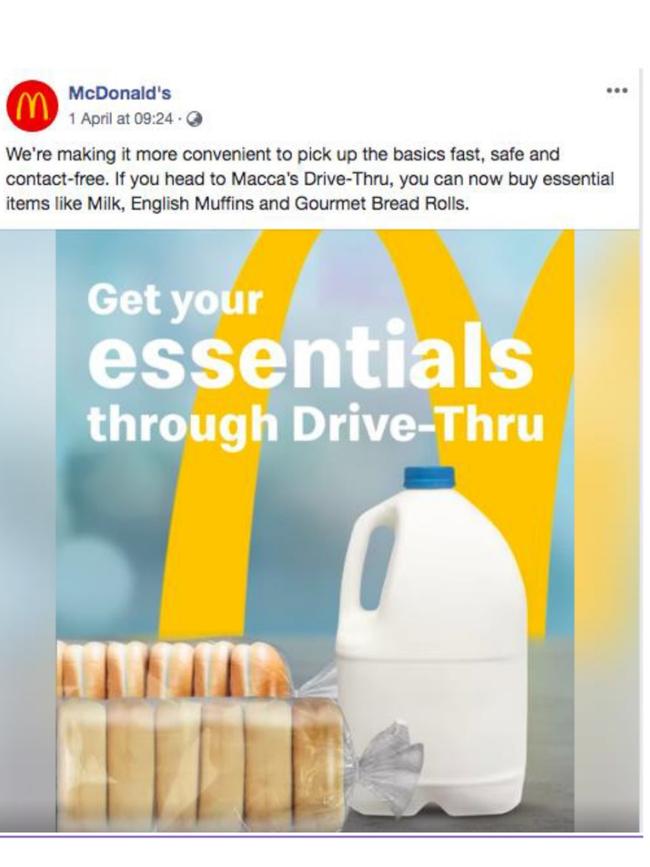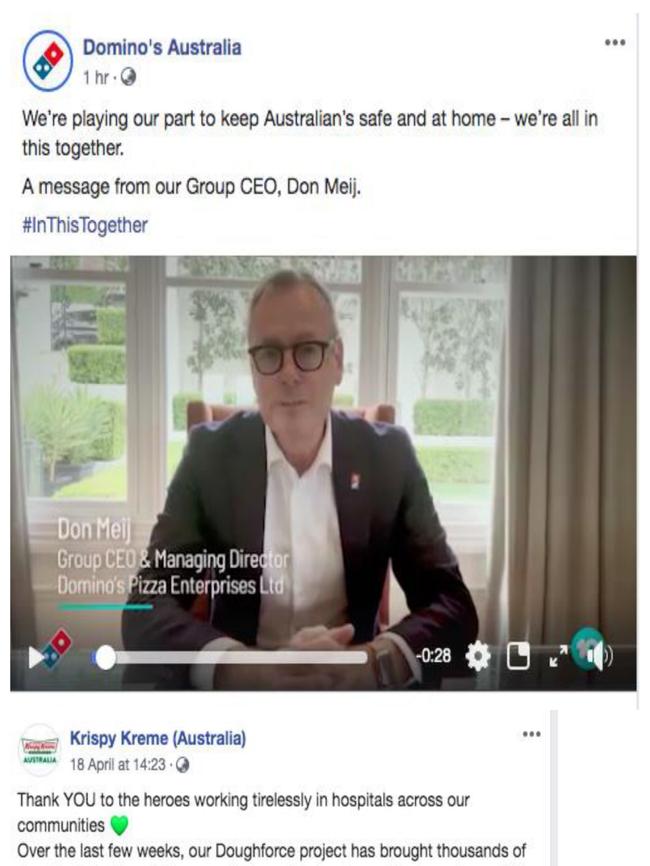Fast food companies accused of cashing in on COVID-19 pandemic
Fast food giants like McDonald’ and Domino’s have been accused of targeting a nation in lockdown, using clever marketing ploys to cash in at a time when people are anxious and bored at home — and not sticking to healthy diets.
NSW
Don't miss out on the headlines from NSW. Followed categories will be added to My News.
The fast food industry has been accused of using marketing strategies to cash in on the pandemic lockdown.
Domino’s Australia is promoting “5 reasons to eat pizza in isolation”, Red Rooster is featuring “social distancing” in its promotions and McDonald’s is encouraging customers to pick up essentials such as bread and milk in its drive-through service.
Dietitian Alison McAleese, from the Cancer Council-backed LiveLighter public health campaign, said it was “irresponsible” for companies to exploit people’s boredom and isolation.


“These companies know they have a captive audience, children are home a lot and we are particularly worried about that,” she said.
“There has been evidence that obesity has been linked to worse outcomes for COVID, so we would like to see Australians eating healthy at the moment and that is being undermined.
“We are being asked to stay home in order to protect our health. The heavy promotion of energy-dense food with little to no nutritional value is hardly the type of marketing we need at this time.
“This is a difficult time for many, with some turning to unhealthy foods for comfort or out of boredom, making them primed for this type of marketing.”
MORE FROM JANE HANSEN:
Aussie stem cell trial for sickest COVID-19 patients
Rugby league stars join covidiot anti-vaxxers
The Obesity Policy Coalition’s executive manager Jane Martin said fast food giants McDonald’s and Hungry Jack’s were also targeting healthcare workers with free drinks and Krispy Kreme’s “Doughforce project” is delivering doughnuts to hospitals.
“At a time when people are staying home to protect their health, 27 per cent are saying they are not eating as healthy as before — but we really need people to stay as healthy as they can,” Ms Martin said.
“We’re all a bit vulnerable right now. I think the unhealthy food industry has pivoted very quickly to meet people where they are, at home, much more time on screen, bored, isolated and captive.
“Even McDonald’s offering the bread and milk, you know: ‘We’ll give you the basics, would you like fries with that?’ as you go through.”


Ms Martin said some companies were marketing directly to children, capitalising on the increased screen time at home and marketing their unhealthy products as a way to fight boredom with games such as the Skittles art competition.
“These companies know they now have a captive and impressionable audience and are taking full advantage,” Ms Martin said.
“We know that marketing influences what kids eat and what they pester their parents for.”
Last month a McDonald’s advertisement was pulled after The Advertising Standards Community Panel found the company in breach of the Quick Service Restaurant Initiative for Responsible Advertising and Marketing to Children (QSRI) after a complaint by the Obesity Policy Coalition was upheld.

The advertisement, titled “Denise”, was found to have directly marketed high fat, salt and sugar meals to children, which is a contravention of the code to which the company is a signatory.
“This ad focuses entirely on a little girl who, after getting into mischief, is ‘rewarded’ for fixing her bad behaviour with a trip to McDonald’s for a toy and a Happy Meal; a very covert pester power tactic,” Ms Martin said.
Greystanes mother of three Raylene Merlino said she kept a tight rein on the children’s screen time but was well aware of fast food marketing tactics that caused headaches for parents.
“The kids just nag and nag and nag until you cave in, so it pressures parents. It’s wrong,” she said.
Originally published as Fast food companies accused of cashing in on COVID-19 pandemic


